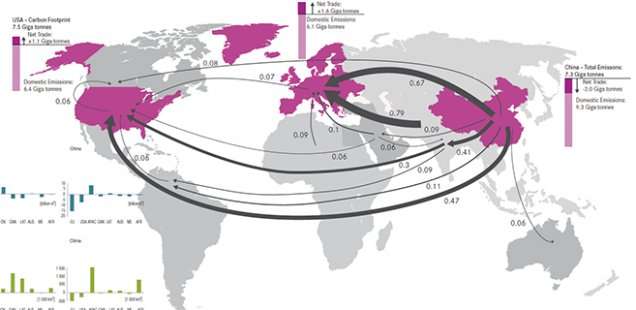Journal explores database that quantifies environmental impacts in a 'global' world

How do you measure a nation's environmental impact when half its goods are imported from China and other regions?
Over the past decade a consortium of European researchers has developed a database, known as EXIOBASE 3, that offers new clarity on the increasingly complex links between international trade, consumption, and environmental impact. The database—technically, a "global environmentally-extended multi-regional input-output" (EE-MRIO) database—enables new insights to be drawn about the environmental impact of trade, who benefits from it, and who is harmed by increasing globalization.
In a new special issue, Yale's Journal of Industrial Ecology examines how this database was designed and built—and how it will improve understanding of the effects of trade, bolster resource efficiency, and provide a knowledge base for global policy.
"EXIOBASE 3 gives researchers—and policymakers—the ability to see how international trade relates to resource use and environmental impacts," said Reid Lifset, editor-in-chief of the Journal of Industrial Ecology. "This new special issue demonstrates how it can be used to assess not only the global impact of production of goods and services but also their consumption. Instead of examining environmental impacts generated by country or territory, this approach reveals the resources used and environmental impacts brought about globally through consumption."
In one paper, researchers analyze the effect of international trade on the environment and the efficiency of resource use between 1995 and 2011. According to their findings, there was some level "decoupling" of economic growth and environmental impact. However, they found that this phenomenon was limited—or even saw reduced efficiency—for material use that increased at a rate faster than GDP.
Several articles examine how the database can advance and shape future research. Others present an agenda for connecting research and development of statistical datasets—and the policy implications globally.
Authors use EXIOBASE 3 to examine the potential for climate policy to decrease global emissions from diets and the potential danger of "rebound effects." In another paper, researchers examine the issue of food waste, finding that measures to reduce consumer food waste could reduce resource use 10 to 11 percent along the value chain.
"This database affords a rich level of breadth: many countries, a wide range of products, and multiple environmental endpoints," said Lifset. "This special issue documents this powerful advance, explaining its origins and design, and how it can be used to further our understanding of consumption, trade and the environment."
Provided by Yale University
















